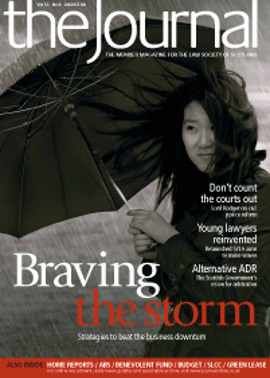Bare necessities

It is a truth generally acknowledged, but not always publicly, that the smooth running of a criminal court owes a lot to the attitude of the defence agents who regularly appear in it. This truism came to mind recently when I read in the Guardian an article by Ian Loader, Professor of Criminology at the University of Oxford, which stated: “New Labour has passed more crime legislation since 1997 than was enacted in the previous century. It has created more than 3,000 new criminal offences.” For the moment it may be sufficient to remark that it would be nice if the government which appears to be so keen on expanding crime were to show how much they value those involved in the proper process of law.
Weapons and intent
That said, if members of the public have read one case this year it is probably Frame v Kennedy [2008] HCJAC 25; 2008 GWD 14-257. That is the case about the stripogram performer who dressed as a police officer and in the interests of verisimilitude carried with him two batons and a spray container. The presiding sheriff found that the batons were offensive weapons per se, but concluded that in the circumstances there was no evidence to suggest that there was any intention of causing harm with them. On the basis that the respondent had the items as props, he was held to have a reasonable excuse for having them in his possession. Somewhat surprisingly the Crown appealed, contending that any consideration of a person’s intention was irrelevant when he was in possession of weapons offensive per se. The appeal court would have nothing of this. This decision will no doubt come as a relief to the Lyceum Theatre in Edinburgh, whose season will start shortly with the performance of Macbeth.
Two rather more serious cases which also attracted a lot of public attention are Fraser v HMA [2008] HCJAC 26; 2008 GWD 17-298, and Mitchell v HMA [2008] HCJAC 28; 2008 GWD 18-315. They are mentioned here mostly for purposes of reference, but the latter case does contain a number of useful observations by the appeal court about the possible effect of pre-trial publicity on the fairness of a prosecution.
The essence of Moorov
It may be thought that one of these articles without a reference to Moorov v HMA 1930 JC 68 would be like porridge without salt, and in that connection it is fortunate that we have McKenna v HMA [2008] HCJAC 33; 2008 GWD 22-359 to consider. The appellant faced a number of charges, the important ones for our purposes being two charges of assault against two male pupils under the age of 14, and a charge of lewd, indecent and libidinous practices towards a third. It was argued on behalf of the appellant that one charge of digital penetration could not corroborate a charge of attempted sodomy, which was said to be of a different character and gravity.
The appeal court would not have this, concluding in the first place that there was no reason in law for attempted sodomy to be regarded as a more serious crime than actual digital penetration, and that accordingly the case of HMA v Brown 1970 SLT 121, which is authority for the proposition that a less serious offence cannot corroborate a more serious one, did not apply. So far as the similarities are concerned, it was held that a criminal pattern of behaviour had been established with the charges relating to the same period, concerning pupils of about the same age, and all involving interference with the lower body. Clearly the appeal court found that the jury was entitled to hold that a pattern of criminal conduct had been established, which is, of course, the critical thing.
Withdrawal from acting
One of the hazards sometimes faced in criminal trials is that of the accused person suddenly becoming unrepresented. In Mason v HMA, 27 May 2008; 2008 GWD 22-360 the appellant’s counsel withdrew following the appellant’s failure to sign a mandate clarifying his instructions. The appellant then requested an adjournment so that he could seek fresh legal representation, but this was refused by the trial judge. The case had already been adjourned twice, the appellant’s co-accused would require to be detained in custody for a further period of months and a witness had travelled from abroad to attend the trial.
The appeal court however held that there had been a miscarriage of justice in relation to the appellant who had been obliged to represent himself. It appeared that the possibility of a short adjournment so that he might seek representation had not been considered. Further, in balancing the undoubted inconvenience which would have been caused, the court held, in the absence of evidence that the appellant was being “deliberately obstructive”, and given that he could not, and did not, present his defence as well as the legal representative had done, that the balance was in favour of allowing the adjournment.
Evidence of the deceased
A somewhat less familiar situation occurred in the case of Humphrey v HMA [2008] HCJAC 30; 2008 GWD 18-313, which concerned the admissibility of the evidence of someone who had died subsequent to giving a statement. The crime involved was assault and rape, and the evidence admitted was that of a man (R) who had said that he had seen the appellant dragging a woman (X) across the street and lying on top of her, and had heard X moaning during and after the event. There was surrounding evidence to the effect that before this happened X had left a taxi with the appellant, unharmed although drunk, and that later she was found to have been very seriously injured. It was argued on behalf of the appellant that as X could not remember what had happened, R’s evidence was essentially the substance of the Crown case. It was submitted that either the case should have been withdrawn from the jury or the jury instructed to ignore R’s evidence. It was submitted that because R had had poor eyesight his evidence was prima facie unreliable, and thus there was a greater need than usual for him to be cross examined. The appeal court held that no unfairness had been involved in admitting R’s evidence, and pointed out that in so far as he spoke to hearing moaning this had nothing to do with his eyesight.
Statements to the media
Finally, it seems probable that if the general public is familiar with the stripogram policeman case, members of the profession will already have acquainted themselves with what the High Court had to say in Anwar [2008] HCJAC 36; 2008 GWD 23-368. For those not familiar with the case, this was a hearing on potential contempt of court following a remit by a trial judge to the High Court, in respect of inter alia a statement to the media made by the solicitor for an accused immediately following the jury’s verdict, and also a statement made in a news bulletin. The appeal court held that there had been no contempt of court in respect that the authority of the courts and supremacy of the law had not been challenged or damaged by the statement. However the appeal court did go on to make certain observations about standards of behaviour to be expected of solicitors making public utterances. While these remarks may be obiter, it would appear prudent for any solicitors who feel inclined to make public statements to read, mark, learn and inwardly digest what was said – something which, it has to be said, not all of those commenting on the matter appear to have done.
PS Since writing the opening paragraph, I have heard on the radio that there are now over 1,000 purposes for which forcible entry to one’s dwelling can be obtained. This includes checking the fridge for emissions, not presumably a problem in the days when the Englishman’s home truly was his castle.
Literary pick: Kidnapped
“… a red-nosed, blear-eyed, drunken dog, with a great bottle of whiskey in his pocket, and a long story of wrongs done to him by all sorts of persons, from the Lord President of the Court of Session, who had denied him justice, to the Baillies of Inverkeithing, who had given him more of it than he deserved” – a disgruntled litigant with a walk-on part in chapter 26 of Kidnapped by Robert Louis Stevenson.
In this issue
- Where have we come from, where to next?
- Shifting sands
- A rank bad rule
- Braving the storm
- Civil justice: where next?
- Title Conditions Act: new registration procedures
- Young lawyers reborn
- Shining some more light...
- Power to the tribunal?
- Piece by piece
- The poor in our midst
- The Society's future role in complaints handling
- Appreciation: Lord Johnston
- Professional Practice Committee
- Facing the lean years
- It's a web 2.0 world
- Questions, questions
- Bare necessities
- Coming on the blind side
- Relocation, relocation
- Worse than the disease?
- Sleeping bounty
- Scottish Solicitors' Discipline Tribunal
- Website reviews
- Book reviews
- Industry standard
- Meet the committee
- What's in a motto?
- Leasing by example
- Good call?
- Home reports - the practice questions






